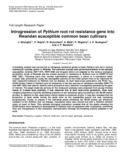| dc.description.abstract | Family businesses contribute significantly to the growth of any nation. Many
multinational corporations started as family businesses and so there is need to ensure family
businesses continue to grow. The continued existence and growth of the businesses depend on
the strategies that are in place and one of the key concerns for a family business is to retain
the entrepreneurial spirit across generations and overcome retardation or avoid demise as
the business grows.The business vision needs to be developed, implemented and changed by
successive generations to accommodate growth and give a sense of ownership to the
business. Family businesses have the potential to grow and become multinationals. A good
example is Mabati Rolling Mills which started in 1961 in Nairobi’s industrial area by the
Chandaria family and is today a global player. This family business has propelled upwards
due to the growth strategies they have continued to adopt.Mabati Rolling Mills has over the
years adopted various growth strategies such as mergers, exporting, new product
development, modernization, product differentiation and innovation and market research.
These growth strategies have led to the growth and expansion of the company | en_US |

